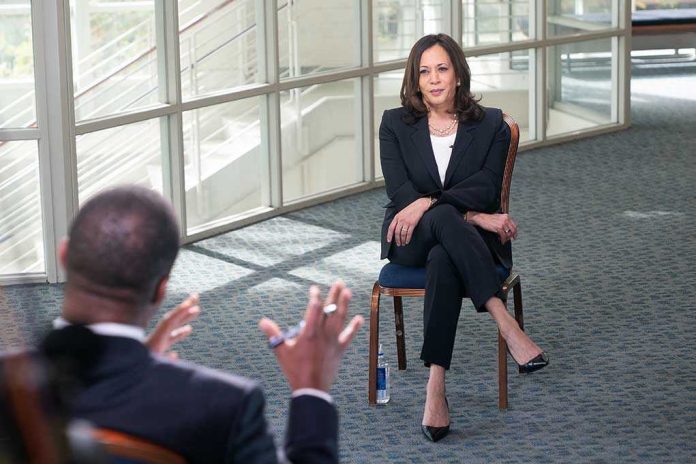
When Jon Stewart looked Kamala Harris in the eye and asked if “more time” was really enough to sway an election lost to Donald Trump, the answer revealed cracks not just in a campaign, but in the soul of a party searching for its future.
Story Snapshot
- Jon Stewart publicly challenged Kamala Harris’s main excuse for her 2024 presidential defeat, pressing for deeper answers on Democratic strategy.
- Harris argued her policies were popular and her campaign simply needed more time for its message to resonate; Stewart expressed direct skepticism.
- The exchange triggered intense debate about Democratic accountability, messaging, and the impact of misinformation in modern elections.
- Party leaders now face mounting pressure to confront uncomfortable truths as they chart the next chapter in American politics.
Jon Stewart Confronts Kamala Harris: The Moment That Sparked a Firestorm
Jon Stewart, renowned for holding power to account, did not mince words on his October 30, 2025 episode of The Weekly Show. Facing Kamala Harris, freshly defeated in the bruising 2024 presidential race, Stewart posed the question gnawing at Democrats nationwide: Was time really the missing ingredient, or did the campaign’s messaging and strategy fundamentally fail? Harris, defending her campaign, insisted that her policies resonated but required more exposure. Stewart’s skepticism echoed widespread doubts about whether voters simply needed longer to embrace the Democratic vision, or if deeper flaws undermined the effort from the start.
The conversation instantly reverberated throughout political circles. Stewart’s refusal to accept familiar post-defeat rationalizations forced Harris, and by extension the Democratic Party, into an uncomfortable spotlight. Viewers saw a rare instance of a major political figure being pressed for introspection, not just pageantry. Stewart’s platform, historically a blend of humor and piercing analysis, amplified the call for accountability. For many, this was the kind of conversation too often avoided in the aftermath of electoral failure—a demand for honest answers over rehearsed excuses.
Inside the Democratic Party’s Crisis: Accountability, Messaging, and Misinformation
Within hours, party strategists and commentators dissected the interview, scrutinizing Harris’s defense and Stewart’s challenge. Harris maintained that her campaign’s progressive policies struggled against a tide of misinformation and relentless Republican attacks. She argued that, given more time, her message would have broken through. Stewart, however, pressed on the point that time alone could not fix foundational issues like lackluster voter enthusiasm, fragmented messaging, and the party’s inability to counter Trump’s populist appeal. After two consecutive cycles defined by polarization and distrust, Democrats faced a familiar reckoning: Was the problem really the clock, or the way they communicated their vision?
Political analysts, referencing prior Democratic post-mortems, cautioned against the lure of convenient excuses. They pointed to Harris’s persistent low favorability ratings and the party’s struggle to unify its base as symptoms of broader strategic weaknesses. Academic experts in political communication weighed in, arguing that effective messaging requires not just repetition but clarity, resonance, and adaptability to rapidly shifting media environments. The interview thus became a flashpoint for larger debates about how Democrats engage voters—and whether introspection or inertia would drive the party’s recovery.
The Ripple Effect: How This Exchange May Shape the Party’s Future
As the dust settled, the Stewart-Harris exchange fueled renewed soul-searching within Democratic ranks. Party leadership, facing pressure from both progressives and moderates, recognized the urgency of addressing fundamental strategic flaws. Grassroots activists demanded honest reflection and reform, fearing that continued reliance on timeworn excuses would doom future campaigns. Meanwhile, Republican strategists seized the moment to frame Democrats as out of touch—unable or unwilling to confront harsh electoral realities.
The long-term implications extend beyond Harris’s legacy. The Democratic Party must grapple with declining trust in institutions, the challenges of reaching a fragmented electorate, and the persistent threat of disinformation campaigns. Media commentators highlighted the vital role of independent platforms like Stewart’s in holding leaders accountable and forcing genuine debates about strategy and vision. Political consultants began reassessing best practices for messaging, outreach, and candidate selection—knowing that the old playbook may no longer suffice in a rapidly evolving political landscape.
Expert Perspectives: What the Stewart-Harris Interview Reveals About Modern Politics
Seasoned observers recognize Stewart’s skepticism as emblematic of a larger demand for transparency and accountability in American politics. While Harris’s rationale echoed the familiar refrain of “just a little more time,” experts cautioned that such explanations often mask deeper problems: unclear messaging, lack of voter enthusiasm, and strategic missteps. Some commentators defended Harris by citing the unique challenges of the 2024 cycle—economic uncertainty, intense polarization, and sophisticated misinformation efforts. Yet others insisted that only by confronting uncomfortable truths could Democrats hope to rebuild public trust and regain electoral momentum.
The exchange also underscored the importance of credible, fact-based analysis in an era of media fragmentation. The interview’s substance and tone were confirmed by multiple reputable sources, from the original podcast transcript to major news outlets. No significant contradictions emerged, lending weight to Stewart’s critique and Harris’s defense. Ultimately, the moment captured on Stewart’s show may become a defining chapter in the Democratic Party’s ongoing quest for renewal—a test of whether honest debate, not comforting platitudes, will shape the future of American politics.
Sources:
Splinter commentary on Stewart’s media role
The Weekly Show with Jon Stewart (podcast transcript)

